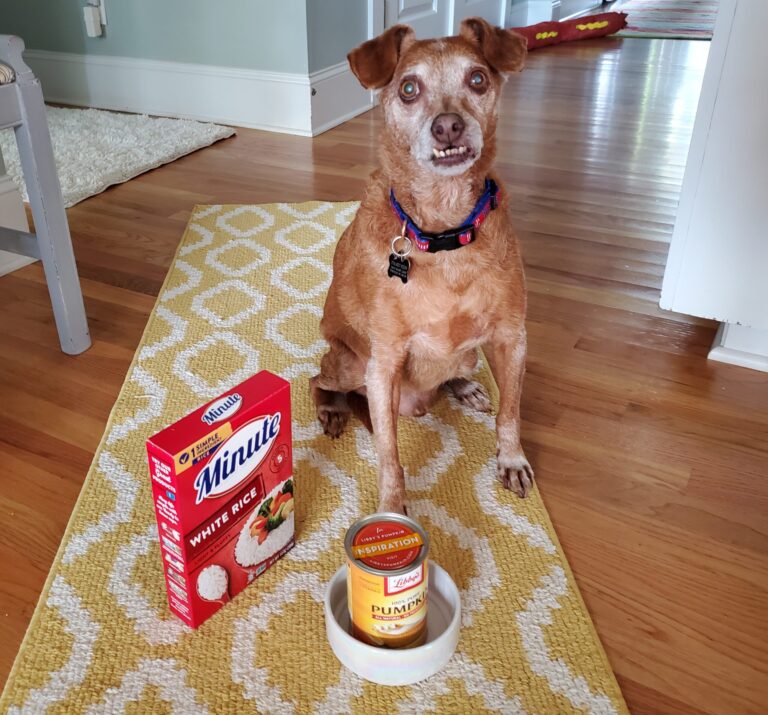You can give a dog plain, cooked white rice and plain, cooked, lean ground turkey for an upset stomach. Additionally, you may also give your dog plain, cooked, unseasoned pumpkin as it can help ease digestive issues.
To provide relief for your dog’s upset stomach, it’s important to know what you can safely give your pet without causing further issues. Whether your dog is experiencing diarrhea, vomiting, or other digestive discomfort, there are simple and natural remedies that can help soothe their stomach.
It’s crucial to be mindful of what you feed your dog during these times, as certain foods can exacerbate the issue. Understanding what is suitable for your pet’s stomach and being prepared with the right remedies can help your dog feel better in no time.

Credit: www.thewildest.com
Understanding The Causes Of Upset Stomach
Dogs can experience upset stomachs due to a variety of reasons, including dietary indiscretion, food allergies, infections, parasites, and stress. Monitoring your dog’s behavior and identifying potential triggers can help in understanding the root cause of their upset stomach.
Signs and symptoms of an upset stomach in dogs
Signs of an upset stomach in dogs may include vomiting, diarrhea, loss of appetite, abdominal discomfort, and lethargy. Recognizing these symptoms and seeking prompt veterinary care can help in addressing the issue and relieving your dog’s discomfort.
Effective Home Remedies For Upset Stomach
When a dog experiences an upset stomach, there are several effective home remedies that can help alleviate their discomfort. One approach is to implement a bland diet for your dog, consisting of easily digestible foods such as boiled chicken and rice. Additionally, incorporating probiotics into the dog’s diet can promote a healthy digestive system. Natural herbal remedies like ginger and chamomile tea can also be beneficial in soothing the upset stomach. The use of ginger can help to settle the stomach, while chamomile tea provides digestive relief. These natural remedies are gentle on the dog’s system and can offer relief from an upset stomach without the need for medication or harsh treatments.
Professional Treatment Options
When to seek veterinary help for dog upset stomach: If your dog is experiencing prolonged or severe symptoms of an upset stomach, it is important to seek professional veterinary care. Common signs include persistent vomiting, diarrhea, loss of appetite, and lethargy.
Veterinary-prescribed medication for upset stomach in dogs: Upon seeking professional treatment, a veterinarian may prescribe medication to alleviate the symptoms of an upset stomach in dogs. These medications may include anti-nausea drugs, antacids, or antibiotics, depending on the underlying cause of the upset stomach.
Frequently Asked Questions For What Can You Give To A Dog For Upset Stomach
What Can I Give My Dog To Ease His Stomach?
You can give your dog plain, cooked rice or boiled chicken to ease his stomach. Additionally, a small amount of plain yogurt may help with digestive issues. Make sure your dog has access to plenty of water and consult with your veterinarian if the symptoms persist.
Can You Give A Dog Pepto Bismol?
Yes, you can give a dog Pepto Bismol, but only under the guidance of a vet. It can help with an upset stomach, but the dosage needs to be carefully monitored. Over-the-counter medications can be harmful to dogs if not administered correctly.
Always consult a professional.
What Home Remedy Can I Give My Dog For Nausea?
You can give your dog a small amount of ginger, Pepto-Bismol, or slippery elm for nausea relief. Always consult your vet first.
What Can You Give Your Dog For Throwing Up?
You can give your dog a bland diet like boiled chicken and rice to help with throwing up. Make sure to monitor water intake and consult a veterinarian if vomiting persists.
Conclusion
Caring for a dog with an upset stomach requires patience and attentiveness. Offering bland, easily digestible food like rice and boiled chicken may provide relief. Remember to consult with a veterinarian for severe or persistent symptoms. Being proactive and responsive to your pet’s needs can help them feel better sooner.



